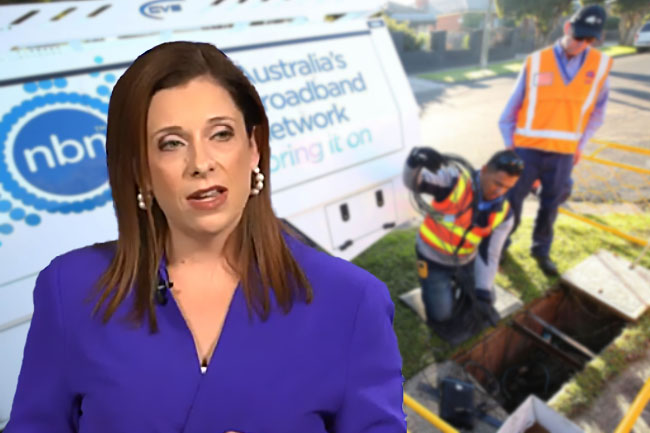We need a bipartisan policy on the NBN instead of Turnbull's quick fixes which will cost us more both financially and in missed opportunities for Australia. Paul Budde, an internationally-recognised independent telecommunications analyst, reports.
YOU CAN'T turn the clock back and in the case of the NBN that means you can’t undo those parts of the multi-technology mix (MTM) without immediately destroying billions of dollars. While it is a pity that the original plan – providing fibre-to-the-home to 93 per cent of the population – can’t be continued, the next best thing is to deliver fibre to as many premises as possible, since that could avoid having to replace the MTM in a few years’ time.
According to the well-respected broadband research company Point Topic —
‘Copper-based technologies (DSL, ADSL and ADSL2+) no longer have the dominant share worldwide. In terms of any connection with fibre in the local loop there are now more infrastructure lines in the ground than end-to-end copper.’
In this context, it simply inconceivable that Australia would continue to go against the trend and install more copper connections.
I find it very frustrating that on the one hand the Coalition comes up with great policies on innovation and smart cities and, on the other builds a second-rate broadband network that will have to underpin innovation, smart cities and a whole range of other developments such as the digital economy, sharing economy, and the connected economy. The Coalition is very well aware of this contradiction as it avoids as far as possible mentioning the NBN in relation to those other policies. If they believed that their version of the NBN would be the best infrastructure for these initiatives they would go out of their way to promote their NBN policy for that purpose. But they don’t ... very telling.
Labor's NBN policy: Keep HFC and current FTTN contracts, return to FTTP for FTTN areas after that. Funding cap $57b pic.twitter.com/nvwuCx4iCK
— Josh Taylor (@joshgnosis) June 12, 2016
If the Turnbull Government is not willing to provide a first-class infrastructure for the nation, it should not be involved in building that infrastructure anyway. Why not leave it to the private industry, which already indicated, in 2005, that it was willing to build a fibre-to-the-node network. There is a good chance – looking at the global development of fibre optic networks worldwide – that by now, 2016, several of these companies would have been well and truly preparing to change the FttNs they built a decade ago to FttH; as a matter of fact, this is precisely what is happening in New Zealand, USA and several countries in Europe.
Here at home, if we look at companies such as TPG, this would have been the case in Australia also. TPG is eager to build FttP networks. However in order to protect their MTM the government has put in place regulations forbidding private industry from building those superior networks.
SMH exposes 457 rorts on Turnbull's primitive NBN disaster #auspol #ausunions https://t.co/fw7Mb7AUu1
— Dave Noonan (@DaveNoonanCFMEU) June 13, 2016
Not only has partisan politics in Australia resulted in the wasting of ten years of broadband infrastructure building; now we won’t even get the network that the rest of the world is building. This is well illustrated by the fact that in 2005 we were number 25 on the international ladder of broadband connections, and every single year since then we have dropped a few positions, today ending up somewhere around the 40th or 60th position (depending on what you measure).
With the rest of the world building fibre networks, there is little hope that Australia will be able to improve that position.
This is not a prestige issue. It has everything to do with international competitiveness, moving our economy more towards innovation, and providing a better lifestyle for the Australian people.
So, while a lot of damage has been done over the last three years, any new fibre that we can get will be an improvement; and, perhaps even more importantly, will bring broadband back into a more positive space and highlight what it can do for our society, economy and other policies such as innovation and smart cities. With a positive attitude by our political leaders towards broadband rather than a negative one we can much better stimulate innovation, smart cities, smart building, and, most importantly, allow our people to be smart people.
All of this requires good, solid, long-term, and above all bipartisan policies — no quick, cheap fixes that are going to cost us much more over time, not only financially but in missed opportunities for our country and our people.
See further research:
- Australia - The National Broadband Network - Moving into 2016
- Australia - National Broadband Network - Cost Benefit Issues
- Australia - National Broadband Network - Developments and Analyses 2016
- Australia - National Broadband Network - Policies and Regulations
- Australia - National Broadband Network - Statistics and Surveys
- Australia - National Broadband Network - Telstra
- Australia - National Broadband Network - The NBN company
Paul Budde is the Managing Director of Paul Budde Communication Pty Limited, trading as BuddeComm (www.budde.com.au), an independent telecommunications research and consultancy organisation. You can also follow Paul on Twitter @paulbudde.
This article was originally published on BuddeCom and is republished with permission.
Time4 a reminder f Turnbull's NBN failure&politicisation:https://t.co/krsJ62Y29V Is Murdoch waiting? https://t.co/YFetl9EYBW
— Rhona Eastment (@bensab3) June 13, 2016
No. 69
Monthly Donation
Single Donation
EXCLUSIVE: NBN boss Ziggy Switkowski breached caretaker conventions during NBN raids rallout, investigation finds https://t.co/yDnbW0j37E
— Federal Politics (@PoliticsFairfax) June 15, 2016
Be informed. Subscribe to IA for just $5.









